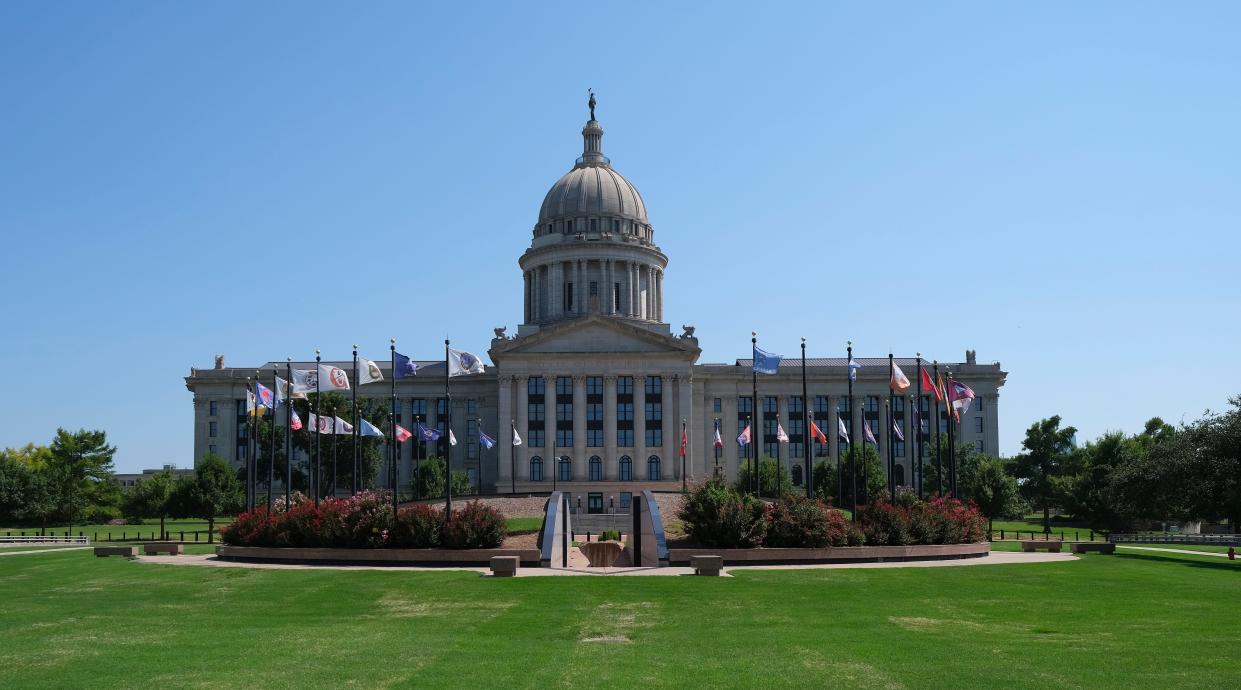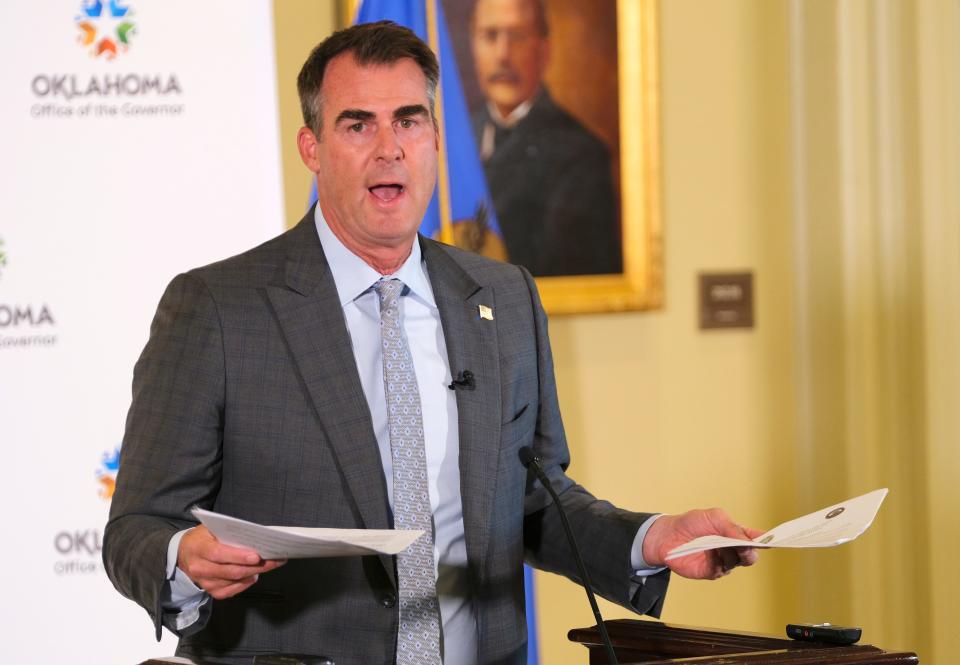Amid legal uncertainty, Oklahoma's governor ramps up rhetoric against tribal governments

- Oops!Something went wrong.Please try again later.
The speech was billed as a summer State of the State address, but it didn’t take long for Gov. Kevin Stitt to fold in some of his most pointed attacks against tribal governments yet.
“There is a storm of injustice that needs to be faced head on,” Stitt told a crowd of more than 1,000 people gathered at a recent Tulsa Regional Chamber event. “There are some that want to ignore the last 116 years of state investments and jurisdiction. They want to turn Tulsa and eastern Oklahoma into a reservation.”
The governor’s message underscored his escalating feud with tribal leaders and the federal government over authority on tribal lands. Stitt has vocally objected in recent months to everything from tax-sharing agreements to tribal court jurisdiction.
“He's fighting other Oklahomans. He keeps saying it’s tribes. We’re Oklahomans,” said Margo Gray, executive director of United Indian Nations of Oklahoma, which represents more than half of the state’s 38 federally recognized tribal governments.
“Would he be doing this to the oil and gas industry? The energy industry? Would be doing this to any other industry? The aerospace industry? No.”
Stitt’s hardline stance has mystified even his fellow Republican state officials, who are now facing off with him in Oklahoma’s highest civil court over the future of state tobacco tax and vehicle registration compacts with tribal nations. After lawmakers voted to extend the compacts for one year, Stitt filed suit hours later to try to block the renewals from taking effect.
“He is wasting an extraordinary amount of state resources pursuing fruitless lawsuits,” Senate President Pro Tem Greg Treat said.
More: What to know about Oklahoma's newest tribal compact dispute
Gov. Kevin Stitt has tried to narrow effects of Supreme Court's McGirt decision
While the compact debate has been front and center of the governor’s latest volley of critiques, he also has denounced three other legal disputes tied to the state’s power on tribal lands.
The thread connecting nearly all of his criticism is the governor’s longstanding protest against McGirt v. Oklahoma, the three-year old U.S. Supreme Court ruling that concluded the Muscogee Nation’s reservation was still intact. The decision has since been applied to seven more tribal reservations, and those lands collectively cover much of eastern Oklahoma. States have limited powers over tribal citizens on tribal lands.

Stitt, a citizen of the Cherokee Nation, has focused on trying to narrow the McGirt decision and limit its effects.
“The McGirt decision continues to wreak havoc on Oklahoma, threatening public safety, our tax base, and our sense of identity as a state," Stitt said Thursday in a written statement to The Oklahoman.
During his Aug. 24 speech to the Tulsa chamber of commerce, he called the authority of tribal governments into question but insisted his objections weren't political. “As the governor, my job is to look out for all four million Oklahomans,” he said, “and right now we are in a fight for the very fabric of our state.”
In a statement issued soon after the governor’s speech, Cherokee Nation Principal Chief Chuck Hoskin Jr. called Stitt’s comments shameful, breathtaking and inaccurate.
“The governor continues to be isolated in his ‘geographic’ fight for Oklahoma as the rest of Oklahoma’s leaders and the state embrace tribes and the U.S. Supreme Court’s McGirt decision,” Hoskin said.
Treat said he believes Oklahoma officials need to accept the McGirt ruling as law and work with tribal leaders to adjust to the changing legal landscape. By refusing to do so, the governor is cutting into the state’s ability to keep people safe and attract new businesses, Treat said.
“Even more critical,” Treat said, “he’s wasting precious time in finding a path forward in a post-McGirt world.”
Governor's divisive statements feed into tensions, tribal leaders say
Treat said he’s seen no signs that the governor has increased talks with tribal leaders over the future of compacts, which became the central policy issue of the summer after lawmakers moved to renew state-tribal tobacco tax compacts on their own, citing inaction by Stitt.
Abegail Cave, a spokesperson for the governor, said Stitt has tried to take a proactive approach to meeting with tribal leaders.
“In recent compact contexts, most of the governor’s communications to tribes have been met with silence,” she said.
Lori Gooday Ware, the chairwoman of the Fort Sill Apache Tribe based in Apache, said it is hard to believe the governor wants to meet with tribes when his public statements are so divisive.
“We bring a lot of money into the state,” she said, referring to tribes’ employment bases and infrastructure investments. “I don’t understand why he keeps making those comments. It’s not good for the state.”
Tribal relations have a particular weight in Oklahoma, a state where one in six residents is Native American and tribal governments collectively employ tens of thousands of people. Three of the four largest tribes, the Cherokee, Chickasaw and Choctaw nations, also routinely donate in state political races. They all campaigned against Stitt’s reelection in 2022.
More: Six key moments defining Oklahoma's relationship with Native tribes under Gov. Kevin Stitt
Stitt has referred to the tribes’ elected leaders as casino bosses and questioned why the state would sign on to any compacts that send more money to those tribes.
Other state officials have accused Stitt of using his personal feud with tribal nations to steer state policy decisions, particularly after he asked the Oklahoma Supreme Court to strike down the compact extensions approved by the Legislature.
Treat and House Speaker Charles McCall, as well as Attorney General Gentner Drummond, contend the renewals are clearly legal.
“The governor’s current litigation is simply a continuation of his fruitless and personal war against our tribal neighbors,” wrote Garry Gaskins II, the top trial attorney in Drummond’s office.
Gray said she believes the governor’s continued criticism stems from a lack of knowledge about the history of tribal nations in the area, which predate the state itself.
“If you’re going to represent a state — know its history,” said Gray, who is Osage and whose great grandfather was murdered during the Osage Reign of Terror a century ago.
“All you’ve got to do is walk out of state Capitol and look at the murals,” Gray said. “Who’s in the murals? Native Americans. All the different tribes are depicted in the building.”

More: Check out the new 'Killers of the Flower Moon' posters and global theatrical release date
One of the biggest targets of Stitt’s criticism in recent months has been a federal appeals court ruling that prevents the city of Tulsa from prosecuting Native Americans in its municipal court, since much of the city lies within tribal reservations. Tribal and federal courts have jurisdiction over Native Americans on tribal lands.
Stitt made the ruling a centerpiece of a new online campaign called “One Oklahoma” and recorded a video message urging for a U.S. Supreme Court review. Justice Neil Gorsuch denied the city’s request to stay the decision until the Supreme Court could decide whether it would pick up the case.
Stitt has called the ruling unfair. “We cannot have a state where a doctor who is part Indian doesn’t pay taxes or get speeding tickets from Tulsa P.D., but a single mom of a different race does,” he said in his Tulsa chamber of commerce speech.
Tulsa police can still issue tickets Native American drivers; the tickets need to be referred to tribal courts to process.
More: McGirt v. Oklahoma, 3 years later: How police work on the Muscogee Nation reservation
Both Drummond and Treat have criticized the governor’s full-court press to legal disputes involving tribes as costing taxpayers hundreds of thousands of dollars.
Drummond cited cost as one of the main reasons he is trying to push the governor out of a separate lawsuit over four tribal gaming compacts. The Oklahoma Supreme Court ruled the agreements signed by Stitt aren’t valid, but the future of two of the deals remains tied up in a Washington, D.C., federal court.
Stitt’s private attorneys asked the court in an Aug. 17 filing to deny Drummond’s request, saying political motivations are behind it. “His rhetoric belongs in Oklahoma electoral circles, not in this court,” the governor’s lawyers wrote.
Read more:
Molly Young covers Indigenous affairs. Reach her at mollyyoung@gannett.com or 405-347-3534.
This article originally appeared on Oklahoman: 3 years after McGirt ruling, Oklahoma's governor is raising more objections

